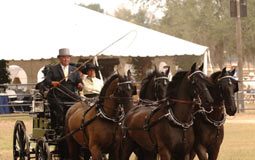 Do you know what to do to keep yourself and your family safe in a flood, tornado, hurricane or other natural disaster? Do you know what to do with your horse in case of a major emergency? Make a plan now so that when the unexpected happens, you’ll be ready to protect your animals.
Do you know what to do to keep yourself and your family safe in a flood, tornado, hurricane or other natural disaster? Do you know what to do with your horse in case of a major emergency? Make a plan now so that when the unexpected happens, you’ll be ready to protect your animals.
Recent tornadoes and floods in the Southeast United States have drawn attention to the devastating effects that severe weather can have on homes and farmland. No one wants to leave their home, but staying there instead of evacuating won’t save your home and will only put you in danger. Here are some tips on planning ahead for a worst-case scenario.
- Find a place to stay. When evacuations are called, the Red Cross and other organizations will usually open shelters in safe areas, but those shelters don’t always allow pets. Finding a safe haven for your horse is even more difficult. Make a plan with friends or family members who have accommodations for your animals and would be willing to put them up during emergencies. You can also network with your local or state equestrian organization or riding clubs to find other members who will provide emergency shelter. Make sure your emergency location is far enough away from your home that they won’t be victims of the same natural disaster that is displacing you and your horses.
- Arrange transportation. If you have a truck and trailer, keep them tuned up and maintained even if you don’t use them regularly. When the threat of a disaster is looming, it’s a good idea to hitch up ahead of time so that you will have time to make sure everything is safe and functional. Most importantly, train your horses to load calmly and quietly so that when you need to leave in a hurry, you won’t find yourself struggling with an unwilling equine.
If you don’t have a trailer of your own, talk to other local horse owners and find out if any of them would be able to transport your horses, or get recommendations for local commercial haulers that can come pick them up.
- Create an emergency kit. Have a few days’ worth of feed, a travel-sized equine first aid kit, and copies of your horses’ up-to-date Coggins, proof of vaccinations and health certificate (if your state requires them) ready to go. Do the same for your pets.
- Don’t wait it out. When an evacuation is called, you may be tempted to wait until the last second to leave, just in case things aren’t as bad as predicted. DON’T. If you wait, you may find that your trailer driver has already evacuated, your emergency shelter is out of space, and the roads to safety are backed up or closed.
- Don’t trap your horses. If you can’t evacuate, such as in case of tornadoes, the best thing you can do for your horses is to let them out in your largest pasture. If the barn is hit by a tornado, high winds or lightning with your horses in their stalls, they could be trapped, injured, or even killed. Leaving them out in severe weather may seem counterintuitive, but they will at least have a chance of getting out of harm’s way. Just make sure to put halters on them and some form of identification that includes your phone number in case your fences are damaged in the storm.
Further Reading
Horse Emergency Information
Prepare your horse and barn for emergencies
Top 10 disaster readiness tips for horse owners from the ASPCA







I alway worry about the horses in storms. So far, I have been very lucky. Good advice, but some things not very practical. How do I remove 12 horses from a farm, with a two horse trailer, and where would they go.
To PKL, time to think about that is now, not then. Bigger trailer???
Good advice.
Hi Pat,
I wish I could afford a different trailer, but with no job, (had the horses before I lost my job), and no unemployment), I just barely can afford feed and hay for the horses. These are all rescue horses, I raised from babies. But I do pray alot.